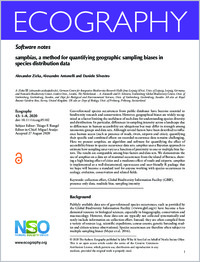Sampbias, a method for quantifying geographic sampling biases in species distribution data
- Zizka, Alexander German Centre for Integrative Biodiversity Research Halle‐Jena‐Leipzig (i, Div), Univ. of Leipzig Leipzig Germany - Naturalis Biodiversity Center, Leiden Univ. Leiden The Netherlands
- Antonelli, Alexandre Gothenburg Global Biodiversity Centre, Univ. of Gothenburg Gothenburg Sweden - Dept for Biological and Environmental Sciences, Univ. of Gothenburg Gothenburg Sweden - Royal Botanic Gardens Kew Surrey United Kingdom
- Silvestro, Daniele Gothenburg Global Biodiversity Centre, Univ. of Gothenburg Gothenburg Sweden - Dept for Biological and Environmental Sciences, Univ. of Gothenburg Gothenburg Sweden - Dept of Biology, Univ. of Fribourg Fribourg Switzerland
-
08.10.2020
Published in:
- Ecography. - 2020, vol. n, no. a, p. n
English
Geo-referenced species occurrences from public databases have become essential to biodiversity research and conservation. However, geographical biases are widely recognized as a factor limiting the usefulness of such data for understanding species diversity and distribution. In particular, differences in sampling intensity across a landscape due to differences in human accessibility are ubiquitous but may differ in strength among taxonomic groups and data sets. Although several factors have been described to influence human access (such as presence of roads, rivers, airports and cities), quantifying their specific and combined effects on recorded occurrence data remains challenging. Here we present sampbias, an algorithm and software for quantifying the effect of accessibility biases in species occurrence data sets. sampbias uses a Bayesian approach to estimate how sampling rates vary as a function of proximity to one or multiple bias factors. The results are comparable among bias factors and data sets. We demonstrate the use of sampbias on a data set of mammal occurrences from the island of Borneo, showing a high biasing effect of cities and a moderate effect of roads and airports. sampbias is implemented as a well- documented, open-access and user-friendly R package that we hope will become a standard tool for anyone working with species occurrences in ecology, evolution, conservation and related fields.
- Faculty
- Faculté des sciences et de médecine
- Department
- Département de Biologie
- Language
-
- English
- Classification
- Biological sciences
- License
- License undefined
- Identifiers
-
- RERO DOC 329619
- DOI 10.1111/ecog.05102
- Persistent URL
- https://folia.unifr.ch/unifr/documents/309110
Statistics
Document views: 114
File downloads:
- sie_smq.pdf: 215
